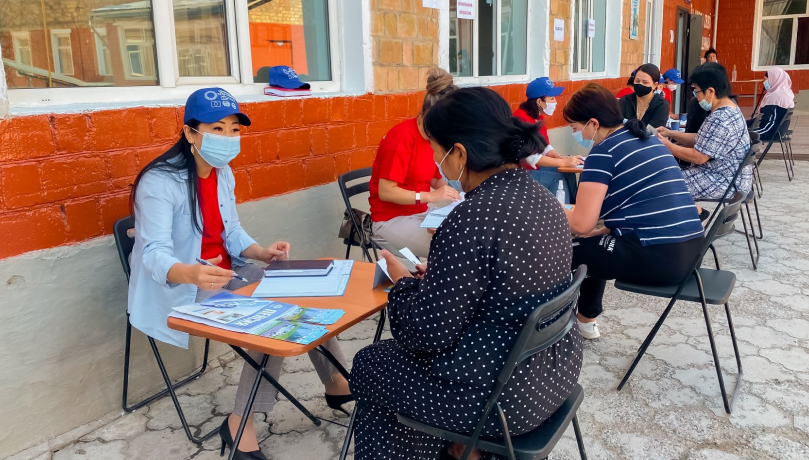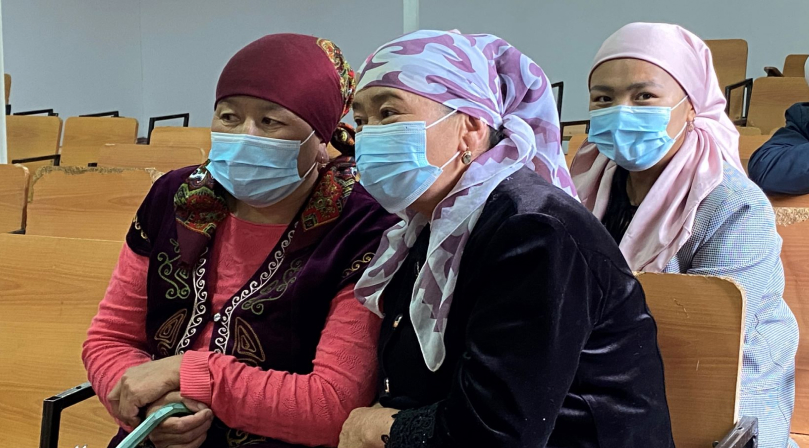Impact by Regions, Countries & Territories
UNDP’s Global Programme supports crisis-affected contexts across all regions to strengthen the rule of law and human rights. In this section, we present five regional overviews, detailing our priorities and approach depending on the context, as well as feature select country and territory results from 2021.
Five contexts from the list (Central African Republic, Democratic Republic of the Congo, Haiti, Mali and Yemen) illustrate the achievements of the Global Focal Point for the Rule of Law (GFP). In peacekeeping missions and transition settings, UNDP’s Global Programme works through the GFP to deliver integrated assistance with our UN partners.
GFP Global Focal Point Highlights
Political
Engagement
The rule of law is essential for sustainable peace and resilient economies, as well as for the prevention or recurrence of conflict. To prevent or address injustice, inequalities or democratic deficits, UNDP works with multiple stakeholders to operate in a way that is consistent with the rule of law and creates opportunities for all individuals to exercise their rights and access justice.
Institution
Building
The importance of strong institutions is more evident than ever as countries and communities respond to disruption, whether because of public health restrictions, climate change or political upheaval. Limitations on public gatherings and travel have revealed the need for institutions that are resilient to disruption.
Community
Security
2021 was a pivotal year that saw various developments affecting peace and security around the world. Civic space continued to shrink and the social contract between states and citizens was increasingly challenged, particularly during and after the response to the COVID-19 pandemic. Facing distressing consequences of climate change, states and communities are forced to manage more cross-border conflicts, triggered by the displacement of people seeking increasingly scarce resources.
Human Rights
Systems
The scope of human rights challenges is widening, from eroded public trust and shrinking civic space to ongoing inequality and human rights impacts in the socio-economic repercussions of the COVID-19 pandemic, and emerging risks in the digital sphere. National human rights institutions (NHRIs), along with other human rights defenders, are facing rising and sophisticated forms of reprisals for carrying out their work.
Access to
Justice
Sustainable Development Goal 16 (Peace, Justice and Strong Institutions) of the 2030 Agenda highlights the importance of access to justice for all for the development of peaceful and inclusive societies. Meaningful access to justice can only be achieved when people know their rights, have the opportunities, agency and capacities to claim them, and have access to independent, inclusive and people-centred justice systems that will respond in a timely, fair and effective manner.
Transitional
Justice
Without justice, there can be no lasting peace. In post-conflict, crisis-affected and fragile contexts, truth-seeking initiatives and reconciliation efforts are essential to bring peace to affected communities. The COVID-19 pandemic has slowed down transitional processes as states prioritized their response to the health crisis and measures to support the economy.
Gender
Justice
In 2021, the continued erosion of democracy and the spread of authoritarian trends in politics in many parts of the world contributed to a backlash against women’s rights. The COVID-19 crisis has reversed some of the hard-won gender parity gains by exacerbating pre-existing inequalities and power imbalances. It has also caused a dramatic increase in sexual and gender-based violence (SGBV). All these challenges have been particularly acute in conflict, fragile and crisis-affected settings.
Innovation
New ideas and new strategies are critical to building sustainable and effective development approaches that really meet people’s needs. Technologies and globalization raise new human rights concerns and threaten the rule of law. Responses to the COVID-19 pandemic continue to limit people’s access to basic services. UNDP connected expertise across the globe to learn and adapt. Creating a culture of curiosity and experimentation, these efforts ensured that local needs and expertise were combined with emerging models to bring strategic thinking to people-centred development goals.

Kyrgyz Republic
In Kyrgyz Republic, UNDP provided technical assistance to the Government to align the legislation with the new Constitution adopted in May 2021. Expert advice was provided to the Ministry of Economy and Finance and the Ministry of Justice to undertake a comprehensive legal inventory of 359 laws to integrate international standards and national commitments, including those on anti-corruption, the 2030 Agenda, human rights, gender equality, environmental sustainability and climate change. To ensure public access to information and public participation in the legal revision process, UNDP supported the Ministry of Justice in carrying out a public information campaign.
UNDP supported national efforts to improve access to justice and the quality of the state-funded legal aid system. The new law on Free Legal Aid (FLA) was adopted by the Parliament in October 2021, introducing additional mechanisms for providing legal assistance in civil and administrative cases and extending the category of vulnerable individuals eligible for free legal aid services. Two additional FLA centres were opened in Bishkek and Kaindy to promote legal empowerment across marginalized groups. A total of 17 UNDP-supported FLA centres provided 4,859 consultations to 2,557 people, including 1,464 women, 1,093 men and 59 persons with disabilities.
UNDP enabled the Ombudsperson’s Office of Kyrgyz Republic, referred to as the Kyrgyz National Human Rights Institution (NHRI) to improve the remote provision of its legal aid services, including through the hotline and the new legal aid chat-bot. In addition, assistance was provided for the NHRI’s monitoring visits to closed institutions such as temporary detention centres, neuropsychiatric hospitals and military units. Working with the Ministry of Justice, UNDP facilitated the upgrade of its centralized database of legal acts, the national repository of all laws and legal instruments in the country. Almost 147,000 documents, including 118, 856 bylaws, were uploaded for public use.
UNDP carried out the holistic review of the national legal framework on violence against women and girls, including 74 laws and 60 by-laws. Following this review, national deputies initiated a set of amendments to improve the Law “On Safeguarding and Protection from Family Violence” and the Labor Code, to prevent harassment at a workplace. The Cabinet of Ministers committed to triple the state funding for the crisis centres for violence survivors across the country. UNDP facilitated gender assessments of the Ombudsperson’s Office, the Ministry of Internal Affairs and the Bar Association, encouraging the development of action plans and capacity building activities to improve institutional gender-sensitive and survivor-centred practices. The functionalities of the Telegram bot “Mildet” were expanded to provide innovative legal aid services by women attorneys, including for a wide range of family issues affecting women and girls. A communication strategy was developed to support the national LGBTQI+ platform in promoting and protecting LGBTQI+ rights in Kyrgyzstan.
In line with the approach of leaving no one behind, UNDP promoted and advocated for the rights of persons with disabilities. A regulation on the mandatory provision of sign language interpretation services was developed and approved by a government decree, and a subsequent order of the Ministry of Healthcare and Social Development. Training was provided for 181 journalists and bloggers (including 144 women) on UN Convention on the Rights of Persons with Disabilities and disability-inclusive communication. Four journalism faculties, the High School of Justice and the Lawyers' Training Center integrated courses on the rights of persons with disabilities in their curricula.


Key Results: Kyrgyz Republic
2,557 individuals (1464 women, 1093 men and 59 persons with disabilities) received consultations in 17 Free Legal Aid Centers established under the Ministry of Justice.
1,388 residents of Bishkek and 462 individuals from the regions, including 712 men, 1,138 women and 28 persons with disabilities, received legal consultations via a hotline of the Ministry of Emergencies (May 2020 – June 2021).
800 civil society representatives, including from 30 organizations of persons with disabilities, underwent training on the rights of persons with disabilities and non-discrimination. Persons with disabilities were empowered to protect their rights: the number of legal aid claims submitted to FLA Centers in 15 districts increased by 20%.
191 newly appointed prosecutors and investigators attended a capacity building programme on innovations in criminal law, anti-corruption practices, and the protection of business rights in criminal investigations.
